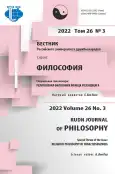A Framework of Social Ontology
- Авторлар: Epstein B.1, Orekhov A.M.2, Moiseev S.V.2, Chernyak A.Z.2, Antonov A.V.3,2
-
Мекемелер:
- Tufts University
- RUDN University
- Perm National Research Polytechnic University
- Шығарылым: Том 26, № 3 (2022): RELIGIOUS PHILOSOPHY OF FRANZ ROSENZWEIG
- Беттер: 582-598
- Бөлім: SOCIAL ONTOLOGY OF B. EPSTEIN AND ITS CONTEMPORARY INTERPRETATIONS
- URL: https://journal-vniispk.ru/2313-2302/article/view/325310
- DOI: https://doi.org/10.22363/2313-2302-2022-26-3-582-598
- ID: 325310
Дәйексөз келтіру
Толық мәтін
Аннотация
The research sets out an organizing framework for the field of social ontology, the study of the of the nature of the social world. Social ontology is also gaining prominence in traditional philosophical discussions. The subject matter of social ontology is clarified, in particular the difference between it and the study of causal relations and the explanation of social phenomena. For any social fact, there are two distinct ontological questions: what is the ground for that fact, why is that fact grounded just the way. Two different inquires are defined and explained: the study of how social categories are “anchored” or “grounded”. The distinction between these inquires is used to clarify prominent programs in social theory, particularly theories of practice and varieties of ontological individualism. Anchoring and grounding are two fundamental aspect to the building of the social world, Correspondingly, social ontology consists of two distinct project - “project of grounding” and “project of anchoring’.
Негізгі сөздер
Авторлар туралы
B. Epstein
Tufts University
Хат алмасуға жауапты Автор.
Email: brian.epstein@tufts.edu
PhD, Professor of Philosophy Department Miner Hall, 14, 6, Medford, МА02155, USA
Andrey Orekhov
RUDN University
Email: orekhovandrey@yandex.ru
ORCID iD: 0000-0002-7025-3244
Doctor of Sciences in Philosophy, Associate Professor, Department of Social Philosophy
Moscow, RussiaSergey Moiseev
Email: moisserg@hotmail.com
independent researcher
Alexey Chernyak
RUDN University
Email: chernyak-az@rudn.ru
Cand. Sc. in Philosophy, Associate Professor Moscow, Russia
Alexey Antonov
Perm National Research Polytechnic University; RUDN University
Email: akvizit@yandex.ru
ORCID iD: 0000-0002-6909-8902
Cand. Sc. in Philosophy, Associate Professor, Perm National Research Polytechnic University; Doctoral Student, RUDN University
Perm, Russia; Moscow, RussiaӘдебиет тізімі
- Watkins J. The Principle of Methodological Individualism. British Journal for the Philosophy of Science. 1953;3(10):186-189.
- Fodor J. Special Sciences. Synthesis. 1974;28(2):97-115.
- Goldstein L. The Two Theses of Methodological Individualism. British Journal for the Philosophy of Science. 1958; 33(9);1-11.
- Lewis D. Convention: A Philosophical Study. Cambridge: Harvard University Press ; 1969.
- Agassi J. Methodological Individualism. British Journal of Sociology. 1960;(11):244-270.
- Agassi J. Institutional Individualism. British Journal of Sociology. 1975;26(2):144-155.
- Sawyer R. Nonreductive Individualism: Part I. Philosophy of Social Sciences. 2002;32(4):537-559.
- Epstein B. The Ant Trap: Rebuilding the Foundations of the Social Sciences. Oxford: Oxford University Press ; 2015.
- Lukes S. Methodological Individualism Reconsidered. British Journal of Sociology. 1968;(19):119-129.
- Bhargava R. Individualism in Social Science. Oxford: Oxford University Press ; 1992.
- Epstein B. Ontological Individualism Reconsidered. Synthesis. 2009;166(1):187-213.
- Dretske F. Explaining Behavior: Reasons in a World of Causes. Cambridge: MIT ; 1988.
- Stalnaker R. On What’s in the Head. Philosophical Perspectives. 1989;(3):287-316.
- Audi P. A Clarification and Defense of the Notion of Grounding. In: Correia F, Schneider, B, editors. Metaphysical Grounding: Understanding the Structure of Reality. Cambridge: Cambridge University Press ; 2012. P. 101-124.
- Clark M, Liggins D. Recent Work in Grounding. Analysis. 2012;(72):812-823.
- Raven M. Ground. Philosophy Compass. 2015;10(5):322-333.
- Correia F, Schnieder B. Metaphysical Grounding: Understanding the Structure of Reality. Cambridge: Cambridge University Press ; 2012.
- Haslanger S. Social Construction: The "Debunking" Project. In: Schmitt F, editor. Socializing Metaphysics. Lanham: Rowman & Littlefield ; 2003. P. 301-325.
- Epstein B. History and the Critique of Social Concepts. Philosophy of Social Sciences. 2010;40(1):3-29.
- Hindriks F. The Location Problem of Social Ontology. Synthesis. 2013;190(3):413-437.
- Searle J. The Construction of Social Reality. New York: The Free Press ; 1995.
- Searle J. Making the Social World: The Structure of Human Civilization. Oxford: Oxford University Press ; 2010.
- Udehn L. Methodological Individualism: Background, History and Meaning. London: Routledge ; 2001.
Қосымша файлдар









